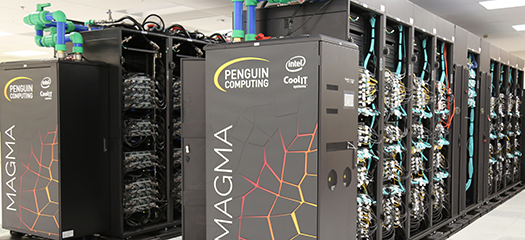The Development Environment Group (DEG) endeavors to provide a stable, usable, leading-edge parallel application development environment that significantly increases the productivity of LLNL applications developers. We strive to do this by enabling better scalable performance and enhancing the reliability of LLNL applications.
DEG partners with its application development user community to identify user requirements and evaluate tool effectiveness. Through collaborations with vendors and other third party software developers, DEG ensures a complete environment in the most cost effective way possible and meets the needs of today's code developers while steering their code development to exploit emerging technologies.
DEG, part of Livermore Computing (LC), is currently involved in the following projects and activities:
- Compilers—Compilers for Fortran 90/95, Fortran 77, ANSI C, and C++; details are available about compilers currently installed on LC platforms.
- Debuggers—See Supported Software and Computing Tools for the available debugging tools, their locations, the machines on which they run, and available documentation (if any).
- Languages—The primary standardized languages used for scientific computing are Fortran, C, and C++. The international organization responsible for standardization in the field of information technology is the International Organization for Standardization/International Electrotechnical Commission (ISO/IEC). The US counterpart is the International Committee for Information Technology Standards (INCITS). JTC 1, SC 22 manages programming languages, their environments, and system software interfaces.
- Parallel tools—Tools are provided on most platforms to allow programmers to take advantage of the parallel nature of the machines. MPI is available on all platforms. See Supported Software and Computing Tools for available parallel tools, their locations, the machines on which they run, and available documentation (if any).
- Performance analysis tools—Various performance analysis tools are available that provide information regarding memory use, hardware counter data, system resource use, and communication. Each tool varies both in ease of use and application perturbation. Several tools provide a GUI for visualization and data reporting. Examination of data is typically done in a postmortem manner; however, some tools have run-time reporting capability. See Supported Software and Computing Tools for available performance analysis tools, their locations, the machines on which they run, and available documentation (if any).
- Scalable I/O—Providing high performance parallel file system and I/O library support for all major platforms at LLNL, working closely with end users for all parallel I/O issues, performing tests using locally developed tools, and collaborating with platform partners, academic researchers, and vendors to address ASC high performance I/O needs.
Team
| Name | E-mail (@llnl.gov) | Assignment/Interests |
|---|---|---|
| Scott Futral | futral | DEG group leader; general environment support, Run/Proxy, findentry, flint |
| Chris Chambreau | chcham | Memory, profiling, and MPI tracing tool support, including mpiP, TAU, Vampir/VampirTrace, and memP |
| Elsa Gonsiorowski | gonsie | I/O user support and parallel file systems performance, MPI-IO, HDF5, and NetCDF |
| John Gyllenhaal | gyllen | Enhancing the CORAL development environment (lrun, lalloc, the srun emulator, wrappers around compilers, bsub, jsrun, etc.), CORAL compiler support, Valgrind/memcheck_all support, debugging strange supercomputer issues |
| Nathan Hanford | hanford1 | |
| Greg Lee | lee218 | Parallel tool development, Stack Trace Analysis Tool (STAT), Python, Intel software (compilers, Inspector, VTune Amplifier, Advisor, Intel MPI, Trace Analyzer and Collector, and Pin), compilers (PGI), debuggers, PRUNERS tools, and math libraries (MKL, Petsc, and FFTW) |
| Nicholas Sly | sly1 | Full programming environments built via Spack, providing installations of AI/ML software |
| Eric Wright | wright117 | Optimizing and debugging LLVM-based compilers; managing LLVM test environments for LC systems; assisting code teams with various problems related to our compilers |
| Local Vendor Support | ||
| Austin Ellis | AMD | |
| Jared Handsome | HPE | |
| Rob Noska | HPE | |



